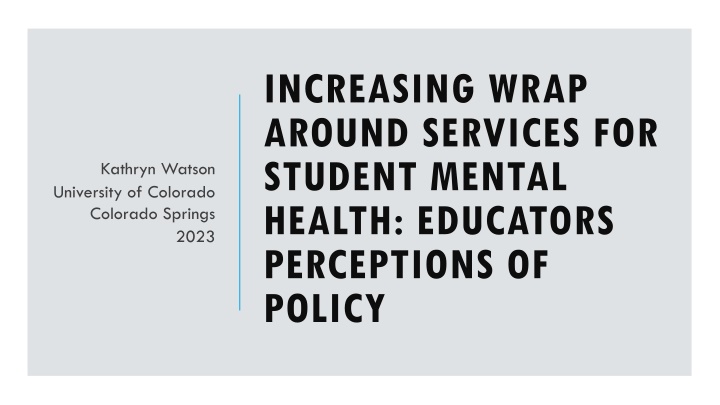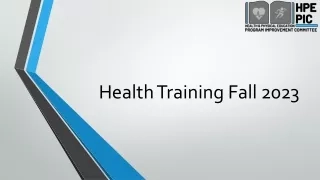
Educators' Perceptions of SHLT-003 Policy on Student Mental Health Services
Explore educators' perceptions of the SHLT-003 policy in North Carolina, which mandates training for identifying and supporting students with mental health needs. The study delves into the challenges faced by American students and the critical role educators play in addressing mental health issues for academic success.
Download Presentation

Please find below an Image/Link to download the presentation.
The content on the website is provided AS IS for your information and personal use only. It may not be sold, licensed, or shared on other websites without obtaining consent from the author. If you encounter any issues during the download, it is possible that the publisher has removed the file from their server.
You are allowed to download the files provided on this website for personal or commercial use, subject to the condition that they are used lawfully. All files are the property of their respective owners.
The content on the website is provided AS IS for your information and personal use only. It may not be sold, licensed, or shared on other websites without obtaining consent from the author.
E N D
Presentation Transcript
INCREASING WRAP AROUND SERVICES FOR STUDENT MENTAL HEALTH: EDUCATORS PERCEPTIONS OF POLICY Kathryn Watson University of Colorado Colorado Springs 2023
Mental Health challenges >20% of American students (Deaton et al., 2022) Mental Health issues direct challenge to academic success (Swick & Powers, 2018) BACKGROUND North Carolina passed SHLT-003 mandating all educators be trained in identified in identifying, referring, and supporting students with Mental health, drug abuse, sex trafficking, and suicidal ideation (Mental Health Needs of Students, 2019)
RESEARCH QUESTIONS 1. What are secondary educators perceptions of SHLT-003? 2. What do educators need to better support student mental health needs?
CONCEPTUAL FRAMEWORK Kennedy's (2005) models of continuing professional development (CPD) Training Model Award-Bearing Model Deficit Model Cascade Model Standards-Based Model Coaching/Mentoring Model Teacher assumptions can shift as result of formal and informal professional development Community of Practice Model Action Research Model Transformative Model 9 types of training models ranging from transmission to transformative learning Aligns with policy requiring PD training
METHODS INSTRUMENTAL CASE-STUDY (STAKE, 1995) ILLUMINATE SPECIFIC EXPERIENCES AND PERSPECTIVES AUTHOR MAY HAVE OVERLOOKED DATA ANALYZED USING STAKE 4 STEP ANALYSIS
DATA COLLECTION IRB Permission before recruiting 9 educators from North Carolina Educators needed 5 or more years to allow for potential of transformative CPD Recruitment varied by district Direct email, district internal recruitment No compensation for study All participating districts complied with mandate via online training models
PARTICIPANT DEMOGRAPHICS Participant Gender Educator Role Years in Education Highest Level of Education Race/ Ethnicity Setting Chriselle Female Special Education Teacher 20 Bachelor s African American Rural Corey Male Success Coach & Social Studies Teacher 14 Bachelor s White Rural Dan Male Student-Support Coordinator 10 Doctorate White Rural Jane Female IB Coordinator 26 Master s White Urban Lynn Female English Teacher 28 Master s White Urban Matt Male Math Teacher 8 Master s White Urban Roger Male Counselor 26 Master s White Rural Ryan Male Psychology Teacher 18 Doctorate White Urban Sam Female Social Studies Teacher 5 Bachelor s White Urban
INTERVIEWS & DATA ANALYSIS Sample: "What are your perceptions of the school mental health policy?" And "What do educators need to better support universal interventions with fidelity?" Semi-structured interviews allowed for additional probing and rich data (Stake, 1995) 1 round average 40 min interviews via Zoom Direct interpretation, categorical aggregation, pattern establishment, naturalistic generalizations Stake (1995) 4 step of data analysis
Recognize positionality to limit bias and recognize preconceived notions (Creswell & Poth, 2018) Female, White, privileged POSITIONALITY Constructivist epistemologies (Creswell & Poth, 2018) Passionate about increasing equity in schools Believe educators have a duty for holistic approach to student support Concerned about high rates of mental health issues
TRUSTWORTHINESS Dependability- replication protected by looking for similar patterns in transcripts (Elo et al., 2014) Credibility- accuracy of findings protected via triangulation in literature (Creswell & Poth, 2018) Confirmability- identified positionality to limit bias (Elo et al., 2014) Transferability- generalizable themes with thick, rich descriptions in participant voice (Creswell & Poth, 2018) Authenticity- captured diverse participant experiences (Elo et al., 2014)
FINDINGS 3 Key Themes Legislation Intent Was Good Roll Out of Legislation Was Poorly Executed Polarized Views of Training Series Legislation Fails to Address Key Educator Needs
LEGISLATION INTENT WAS GOOD- ROLL OUT WAS POORLY EXECUTED Support Intent of Legislation Poor Roll Out/ Low Buy-In I m glad that our state prioritizes the mental wellbeing of our students, especially since we ve seen a sharp increase in mental illness since the COVID pandemic.- Sam Basically...to be honest, it was one more thing we had to do, and it was like you know like, we had to get it done, and so you felt like you already had enough to do.- Chriselle there wasn't any like, hey look, we re doing this because, which would be good. If I know you know, I would have appreciated that like, this is to get everybody on board- Roger
Positive View: I feel like it s so beneficial. I mean, it s just your time and any knowledge that we can have to help the kids that s what we re here for...I think it s great. That was the best training that I ve done...The delivery system was so good. It was interesting...It was presented in a way that was interesting... I appreciate that it wasn t just simply read through take this quiz read through take this quiz.- Corey awareness level of what is going on and really training teachers to pick up on warning signs. I think that is very needed - Jane POLARIZED VIEWS OF TRAINING SERIES Critical View You just click through it.- Roger You cannot put a teacher through a series of little training exercises and think you ve equipped this person to be able to identify the symptomology of the certain disorder.- Ryan
Role Boundaries Unclear Being able to identify [students at risk] as an educator simply from taking an online video course does not make one a counselor and being able to identify does not necessarily mean that the funding has been put behind to actually treat the issue...we just put a band aid on it to then blame it and push it off on someone who is already underpaid, overworked, and overstressed Jane LEGISLATION FAILS TO ADDRESS KEY EDUCATOR NEEDS Need for Resources We need to also, like mention support staff, utilizing support staff, if a kid has a 504 or IEP, you pull in every resource you can keep constant contact with the home front so that you can be supported there.- Corey We need more of everything. We need better pay. We need better resources. We need more people. We need more people that are willing to do it and reach out to those kids. We need school psychiatrists full-time at the school. We need more counselors to address the needs of the students.- Matt
What Are Secondary Educators Perceptions of SHLT-003? Educators had positive view of legislation Districts had poor legislation roll-out Kennedy's (2005) deficit model Training will not address mental health professional shortage (Hopeful Futures Campaign, 2022) Different training models may better celebrate the diverse knowledge of districts DISCUSSION What do Educators Need to Better Support Student Mental Health? Time, infrastructure, and personnel to support students and educators Cheapest not best training mandated (School-Based Mental Health Policy, 2021)
Policy Makers and districts recognize increasing demands on educators (School Mental Health Initiative, 2016) IMPLICATIONS FOR PRACTICE Additional time or financial incentives to complete training (Ormiston et al., 2021) Recognize educator qualifications in developing localized training (Kennedy, 2005)
Examine ways different CPD programs influence educator perception and practice (Kennedy 2005) FUTURE RESEARCH Use Youth Risk Behavior Survey to look for long- term changes in mental health as result of policy (CDC
Timing between March and June = busy time for educator Study not synch with districts IRB review LIMITATIONS Not all districts had rolled out the mandatory training (Walkenhorst, 2021)
Secondary educators need to be able to support student needs as they manifest in adolescents (Giedd et al., 2009) CONCLUSION State/ Districts should use best models of CPD to ensure transformative learning and practice (Kennedy, 2005)
REFERENCES Center for Disease Control and Prevention., (2022). 2019 YRBS results and data now available. https://www.cdc.gov/healthyyouth/data/yrbs/index.htm Creswell, J. W., & Poth, C. N., (2018). Qualitative Inquiry and Research Design: Choosing Among Five Approaches (4thed). Sage. Deaton, J. D., Ohrt, J. H., Linich, K., Wymer, B., Toomey, M., Lewis, O., Guest, J. D., & Newton, T., (2022). Teacher s experiences with K-12 students mental health. Psychology in Schools, 59, 932-949. Elo, S., Kaariainen, M., Kanste, O., Poikki, Utriainen, K., & Kyngas, H., (2014). Qualitative content analysis: A focus on trustworthiness. Sage Open, 1-10. http://www.doi.org10.177/215844014522633 Giedd, J. N., Keshavan, M., Paus, T., (2009). Why do many psychiatric disorders emerge during adolescence? Nature Reviews. Neuroscience, 9(12), 947-957. https://doi.org/10.1038/nrn2513 Hopeful Futures Campaign., (2022). America s school mental health report card. Inseparable. https://hopefulfutures.us/wp- content/uploads/2022/02/Final_Master_021522.pdf Kennedy, A., (2005). Models of continuing professional development: A framework for analysis. Journal of In-service Education, 31(2), 235-250. https://doi.org/10.1080/13674580500200277 Kennedy, A., (2014). Understanding continuing professional development: The need for theory to impact on policy and practice. Professional Development in Education, 40(5), 688-697. https://doi.org/10.1080/19415257.2014955122
MORE REFERENCES! Mental Health Needs of Students, SL 2020-7 (2019). https://www.ncleg.gov/Sessions/2019/Bills/Senate/PDF/S476v6.pdf Ormiston, H. E., Nygaard, M. A., Heck, O. C., Wood, M., Rodriguez, N., Maze, M., Asomani-Adem, A. A., Ingmire, K., Burgess, B., & Shriberg, D., (2021). Educator perspectives on mental health resources and practices in their school. Psychology in the Schools, 58(11), 2148-2174. https://doi.org/10.1002/pits.22582 School-Based Mental Health Policy, SHLT-003, (2021). https://simbli.eboardsolutions.com/Policy/ViewPolicy.aspx?S=10399&revid=48U7 MFDo0bVT5tislshSznCGg%3d%3d&PG=6&st=s hlt-003&mt=Exact School Mental Health Initiative (2016). Findings and Recommendations of the North Carolina School Mental Health Initiative. Stake, R. E. (1995). The art of case study research. Sage. Swick, D., & Powers, J. D., (2018). Increasing access to care by delivering mental health services in schools: The school-based support program. School Community Journal, 28(1), 129-144. https://www.schoolcommunitynetwork.org/SCJ.aspx Walkenhorst, E., (2021). NC schools forming student mental health plans. WRAL.com. https://www.wral.com/nc-schools-forming- student-mental-health-plans/20011659/





















